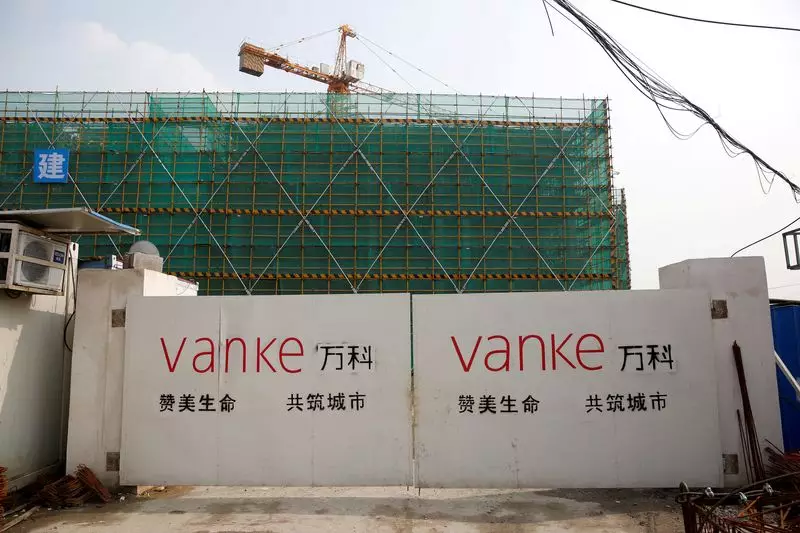In the evolving landscape of China’s real estate sector, few names hold as much significance as China Vanke. As the industry endures a tumultuous period marked by liquidity crises and mounting debts, Vanke has emerged as a focal point for potential government intervention. The ramifications of this situation should not be underestimated, as they could drastically influence homebuyer confidence and the financial ecosystem at large.
For the past several years, the Chinese property market has grappled with a severe liquidity crisis, leading to significant repercussions not just for developers but for the financial stability of local economies. Vanke, a state-backed developer with a substantial presence in major urban areas, has transitioned from a perceived bastion of stability to one brimming with uncertainty. Recently, investigative reports hinted at distress within the company, raising red flags about the potential detention of its CEO and the looming threat of a takeover or reorganization.
These reports, although initially deleted, sets the stage for Vanke’s precarious position as it faces mounting debt obligations. As of June last year, Vanke’s interest-bearing debt reached a staggering 331.3 billion yuan (approximately $45.21 billion). This financial burden is compounded by the upcoming repayment deadlines, the most pressing of which is slated for January 27. The turbulence surrounding Vanke has prompted all three major global rating agencies to downgrade its ratings deeper into junk status, citing escalating concerns regarding its financial flexibility and an unpredictable sales outlook for the upcoming year.
As anxieties about Vanke’s solvency intensify, local governments—particularly in Shenzhen, where Vanke is headquartered—are increasingly engaging with state enterprises to devise a strategy for mitigating debt risks. There is a concerted effort to manage the situation and to salvage assets, acknowledging that failure to address these issues could escalate into a broader financial crisis.
Vanke’s situation holds severe implications for the entire property market in China. Analysts have pointed out that the company’s collapse could undermine the fragile stabilization that has been gradually taking shape after years of market turmoil. Amidst an environment where homebuyer confidence is showing signs of recovery, the waning health of Vanke stands as a risk that could send shockwaves across the sector. Should Vanke default, the erosion of consumer confidence could lead to stringent lending practices from financial institutions, squeezing liquidity for many developers who are already navigating troubled waters.
In such a dire context, the likelihood of government intervention to stabilize Vanke is increasingly being discussed among analysts and market stakeholders. Some commentators suggest that a state takeover—while unprecedented in the current economic climate—could provide the necessary support to avert a crisis. Drawing comparisons to the situation with China Evergrande, which was forced into liquidation after failing to meet its obligations, Vanke’s predicament highlights the urgent need for decisive action to prevent a catastrophic downturn in the property market.
However, the nature of potential government support remains a topic of debate. While some experts advocate for immediate capital injection, others caution against the expectation of direct funding. Instead, a government-led restructuring might involve facilitating the sale of Vanke’s assets to other state enterprises, thereby generating liquidity without necessitating direct financial support from the state.
Additionally, researchers have noted that one of the primary motivations for government intervention could be to ensure the completion of pre-sold homes. This aligns with recent efforts from central authorities to boost homebuyer sentiment, which is critical in maintaining market stability.
As we reflect upon the multifaceted challenges facing Vanke and the broader property market in China, it becomes evident that the path forward remains fraught with uncertainty. Stakeholders must balance the dual objectives of maintaining financial stability while averting a full-blown crisis that could compromise years of progress in real estate reform.
While it is too early to ascertain whether government intervention will materialize, the overarching message is clear: Vanke’s fate will significantly shape the future of the Chinese property market. Optimistically, if handled judiciously, state action could set a precedent for a more sustainable recovery in the real estate sector. Conversely, failure to act decisively may plunge the industry deeper into chaos, bringing critical economic repercussions that extend far beyond the realm of property. The coming months will undoubtedly be pivotal, as both Vanke and the Chinese property landscape navigate this critical juncture.

